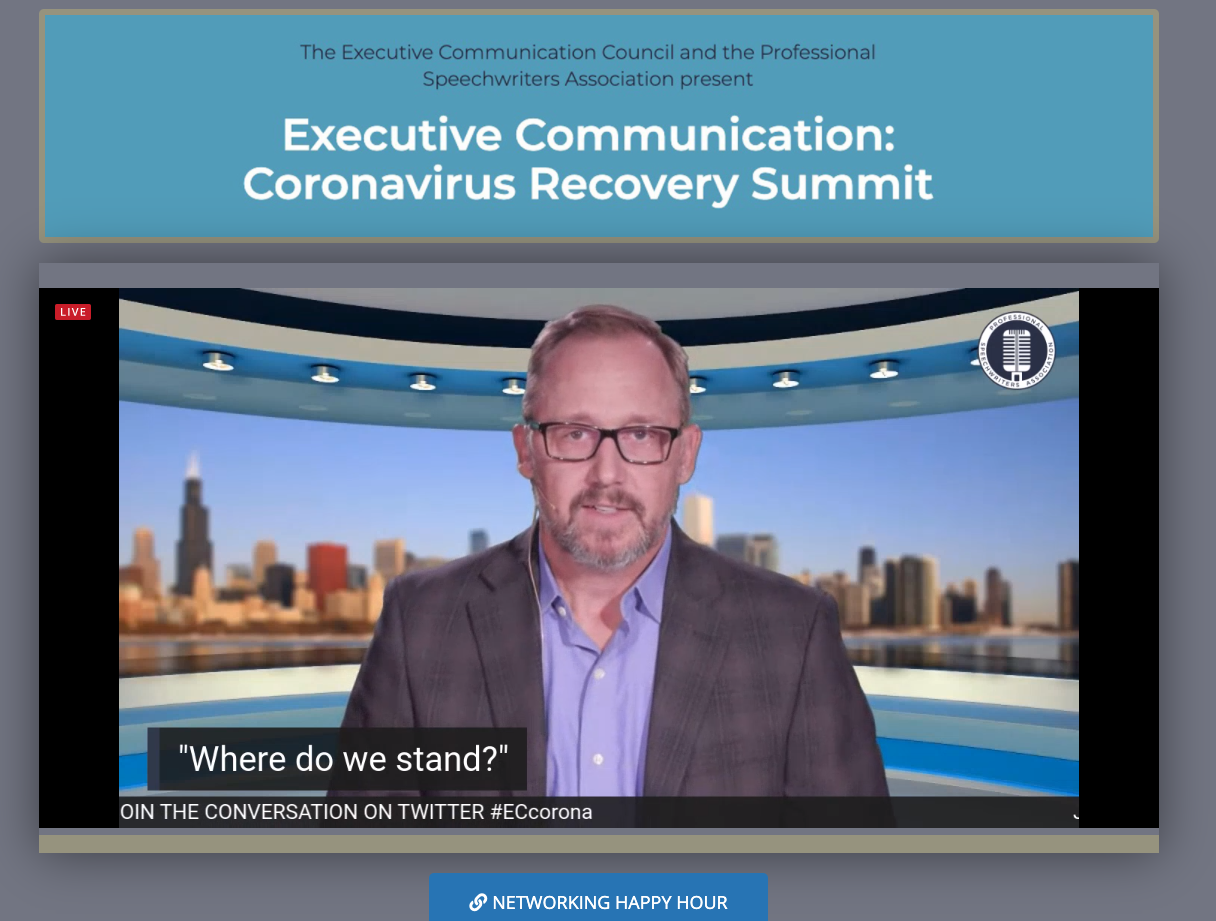Speechwriter, Spiel Thyself
June 03, 2020
After spending careers mimicking their leader's voice and minding corporate mores, speechwriters must find their own voice now.
For almost 30 years, I’ve made some part of my living convening professional speechwriters or covering their silent struggles. If there’s been one prevailing sentiment among speechwriters across all that time, it’s a wish that their leaders would be more candid, more expressive—say something more meaningful than the platitudes they cling to. As one member of the Professional Speechwriters Association put it a couple years ago when asked his greatest professional challenge, “Convincing the boss that it’s okay to be interesting.”
Now the times are so interesting that leaders feel the need to say something meaningful. And their speechwriters, so long constricted by conservative corporate communication conventions, have a kind of writer’s block. Already punch-drunk from coronavirus, they’re now further disoriented by the aftermath of George Floyd.
“Watching today play out with my clients,” summed up one corporate communication consultant this week, “is like watching a bucket of fish that just got tossed into the middle of traffic.”
Over the weekend, a speechwriter for the head of a major American institution sent a note to fellow speechwriters:
“It’s 10:13 PM on a Saturday, and I’m about to go under for the third time on a draft statement about George Floyd and the riots.” The organization doesn’t want to take a stance on Floyd’s death, but does want to express compassion for affected stakeholders. “I assume many of you are engaged in a version of this same folly,” the speechwriters said.
To which another speechwriter replied, “At my most cynical, I can feel like I’m paid for two services: Coming up with a way to say nothing about something or something about nothing. Not easy and work that feels small in these moments.”
For CEOs and their communication people, the “statement fatigue” they’ve been complaining about during coronavirus has given way to something close to statement stupefaction. An executive communication director for a major American institution wrote to me yesterday:
It’s amazing that we now have stacking communication imperatives, which raise so many questions: Do I connect pandemic and the murder/societal unrest, or treat them separately? Do I make an internal statement to staff or also an external one to all? Do I connect the sentiment to our work, even if only tangentially related, or will that seem like a shameless pivot? How much empathy is too much and too little? Should I address the issue of protesting vs. rioting? How important is it to check in with my Diversity, Equity and Inclusion Team (answer: VERY important).
One of the things we’re applying is the WHY test. Asking not “why not,” but “why do?” and seeing how well we can articulate the answer. This helps us make the right decisions (with meaningful goals in mind) and sets us up form framing those messages appropriately so we’re not simply band-wagoning or succumbing to organizational peer pressure. Not being able to articulate a meaningful answer to “why should we message this?” can be very illuminating.
One of the most challenging things for me is impressing on my colleagues that brevity is as important a value as timeliness and content inclusion. Too often, we try to fix by adding, when the actual fix is subtraction. Adding is about thinking “what can we say?” Subtraction comes when you ask “What does my audience most want and need to hear?” A constant mantra in our world.
At least one speechwriter managed to find clarity and shake off the shackles this week. She shared how she managed to write a statement for the head of her organization that astonished even her with its strength. “This was a hard letter to write this morning because I kept self-censoring,” she told me.
I finally got fed up and decided to write the letter I thought the [leader] should write; the letter that I thought he had somewhere inside himself. I figured he could dial it back or scrap it all together in favor of something lukewarm or milquetoast. I was surprised (and pleased) when he only had some minor changes. He’s not one to get out in front of issues or take much risk. I was gratified to see him willing to take a stand. It was less about him liking these particular words and more that he was willing to open up and plant a stake in the ground about this.
I think this was therapeutic for me to write as well.
Speechwriter: Your leader isn’t any better prepared for this cultural moment than you are—less so, most likely. Stop trying to capture her voice, or write something he’ll be comfortable saying. Forget corporate conventions and the various reviewers who normally defend them. At least for the moment, these mores are moot.
Write what you think the leader of your organization ought to say right now. Write it well. And recommend it strongly.
That’s all you can do.
But you can do that much.
And you should.




Loved every word of this post! A timely reminder and nudge of encouragement in truly unsettling times for leaders and writers.
Keep it coming.